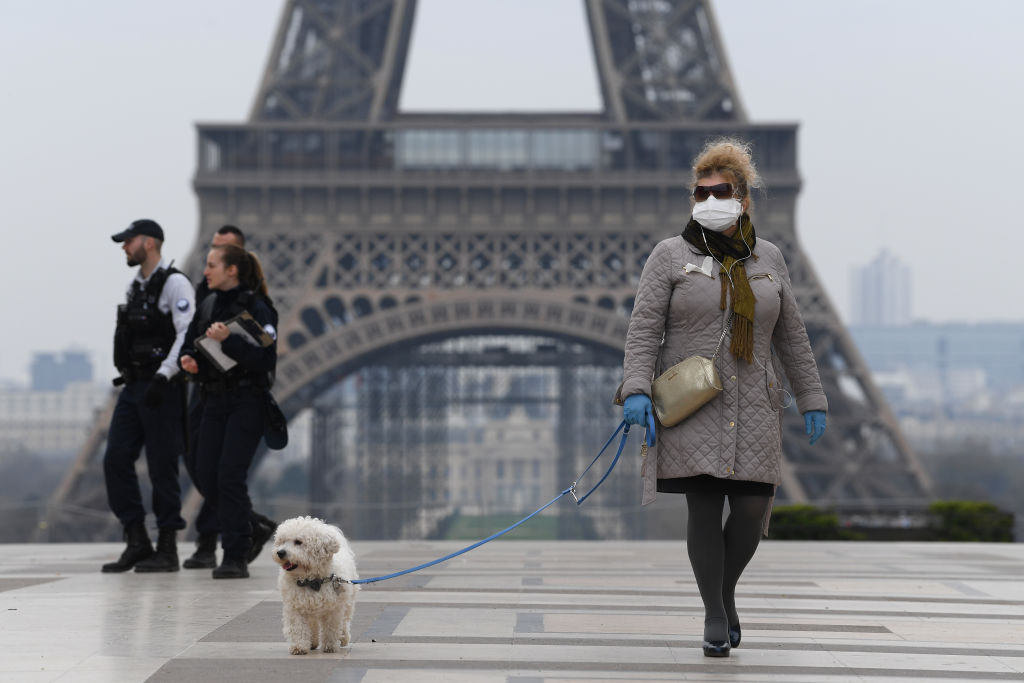Twelve months ago Britain rebelled against Covid hysteria. As Boris Johnson and his Sage modelling committee prepared to lockdown the country for Christmas, they lost control of the narrative.
First 100 Tory backbenchers MPs voted against the PM’s vaccine passport scheme, and a few days later Lord Frost resigned as Brexit Minister. In his resignation letter he expressed his concern about the government’s handling of the pandemic. Urging Johnson to ‘learn to live with Covid’, Frost warned against giving into the sect of the worst-case scenario. ‘I hope we can get back on track soon and not be tempted by the kind of coercive measures we have seen elsewhere.’
Macron has never shown the slightest contrition for his Covid authoritarianism
In reporting Frost’s departure, the BBC, very much part of the doom-monger sect, warned that the latest variant of the virus, Omicron, was spreading fast with 90,000 cases recorded on the previous Saturday. The Beeb, along with much of the mainstream media, wanted another lockdown, given that Sage modelling predicted that deaths could reach 6,000 deaths a day from Omicron. But Johnson desisted, spooked by Frost’s resignation and the backbench rebellion. Rishi Sunak also did his best to argue against further restrictions, as did the editor of The Spectator, Fraser Nelson, courtesy of a remarkable Twitter exchange with Graham Medley, the chair of the Sage modelling committee.
The conversation, in which Medley was admirably candid, revealed the narrowness of the Sage modelling. As Nelson wrote the admissions of Medley ‘raises serious questions not just about Sage but about the nature and quality of the advice used to make UK lockdown decisions’.
The exchange made the national news. As the Daily Telegraph reported, Sage’s modelling ‘is so unaccountable, inherently pessimistic and predisposed towards the destruction of liberty’. In one glorious week the scales fell from the eyes of the British public; it was the week in which the country – to paraphrase Frost – learned to live with Covid. As for Omicron, by late January it was hard to distinguish from a common cold.
In France, however, there has been no such liberation from doom and throughout 2022 the media (the French broadcast media makes the BBC seem blasé) has been gleefully chronicling the sixth, seventh and eight waves of Covid. We’re now on to the ninth. This one arrives at the same time as a wave of influenza and bronchitis, and government scientists have been on television stoking the fear that the ninth wave could be particularly ‘dangerous’.
Macron, of course, is rubbing his hands at the prospect of once again being able to control his country through Covid. The man who this January boasted of his wish to ‘piss off’ the unvaccinated by forcing them to live on the periphery of society has never shown the slightest contrition for his Covid authoritarianism: the forms required to walk the dog, the 6pm curfews, the seven months of hospitality closures and the suspension of all medical staff who demurred from taking the vaccine. France is the only EU country not to have reintegrated its medical refuseniks, and in an interview at the weekend Macron said he saw no reason to change his position.
Had the French media been bold enough to challenge his Covid tyranny Macron might not be so intransigent. But the broadcast and print media – with one or two honourable exceptions – have enthusiastically toed the official line, displaying a general indifference to the data emerging about the devastating impact lockdowns have had on the country, particularly the mental health of the young: the number of 15-24 year-olds suffering from depression doubled in 2020 to 20 per cent.
As I wrote in March 2020, Macron’s Covid strategy from the start was to sacrifice the young to protect the elderly, the demographic which is his electoral bedrock. ‘It’s tough to be 20 in 2020,’ Macron cheerfully said that year. It’s tough to be 22 in 2022, and now comes the prospect of more restrictive measures.
France remains a much more hierarchical and deferential country than Britain, and it’s considered normal that the interests of the elderly are put before those of the young; this is particularly true with self-obsessed Boomer generation.
Unfortunately for the French this generation is in charge of determining the country’s Covid strategy. Prime Minister Elisabeth Borne and Health Minister François Braun, both in their sixties, have urged people to wear masks to protect the ‘fragile’, by which they mean the elderly, and on Sunday Braun said he won’t hesitate to reintroduce measures if cases continue to rise.
Brigitte Autran, president of the health body responsible for Covid, (another Boomer) is urging for such measures, particularly mandatory mask wearing. She also castigated the French for not having their third, fourth and fifth vaccination, calling it ‘sad… the French really need to protect themselves’.
What’s ‘sad’ is the way the French are continually infantalised by the government and its lackeys. People are now wise to the risks of Covid; the stats don’t lie. Ninety-five per cent of France’s Covid deaths are the over 60s. The solution therefore is obvious: this demographic should self-confine and the young should be free to enjoy life unencumbered by masks, social distancing measures and the threat of being punished for refusing a jab.
The sceptics, and there are many in France, believe that the government is purposely making a noise about Covid to distract from the other crises afflicting the country: the rocketing food and fuel prices and the increasing likelihood that there will be prolonged blackouts from January onwards.
According to reports last week the government is drafting plans to shut down the transport network at various times, as well as closing businesses and schools in the mornings. In effect another confinement is looming, a ‘confinement énergétique’, as the French are calling it. The people will be once more shut up in their homes, only this time without any heating. Perhaps their masks will help keep their faces warm.







Comments